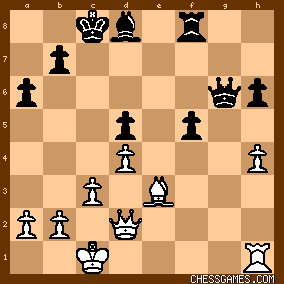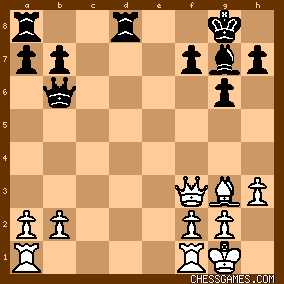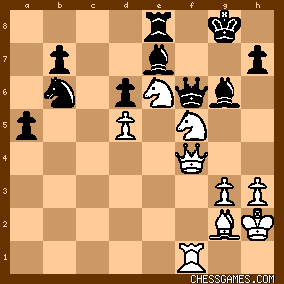|
As part of his preparation for the Euwe - Flohr (1932) match, Salomon Flohr played a short match in April 1932 against the 26 years old Dutch master Johannes van den Bosch, a strong amateur who came joint second with Conel Hugh O'Donel Alexander in a small tournament at Cambridge, England, in March 1932, behind Mir Sultan Khan. He was thought sufficiently strong to represent Holland in the first three Olympiads. Van der Bosch had previous experience of playing a top grandmaster one-to-one; he had lost a short match to Akiba Rubinstein (+0 =0 -3) in 1930. The match was delayed by a difficulty in finalising the funding. (1) It lasted from 14-23 April 1932 and was played in The Hague. Match score
1 2 3 4 5 6 7 8
1 Flohr 1 ½ ½ 1 1 ½ 1 ½ 6
2 van den Bosch 0 ½ ½ 0 0 ½ 0 ½ 2
Cumulative score: 1 2 3 4 5 6 7 8
1 Flohr 1 1½ 2 3 4 4½ 5½ 6
2 van den Bosch 0 ½ 1 1 1 1½ 1½ 2
Van den Bosch had White in the odd numbered games. Flohr won +4 -0 =4, (2) but came close to defeat in Game 3, and his opponent played sharply and with aggression. Flohr was superior in noting and seizing tactical opportunities. Van den Bosch lost material in three games (1, 4 and 7) due to overlooking short sharp combinations.Highlights of the match Game 1. Van den Bosch played aggressively against Flohr's Caro-Kann defence, but Flohr outplayed him in the late middlegame. He weathered the storm, and in a position whose outcome seemed to be a draw, he was alert to the possibility of a tactical coup. 
click for larger viewVan den Bosch had played 29...Qd2 to prevent the advance of the <f> pawn, but Flohr saw that he could push the pawn through, as 30.Bxf4? lost to 30...Qe4 attacking two pieces. The release of Flohr's King's bishop soon decided the game. Game 2. Despite his loss in the first game, van den Bosch again played sharply, using the new hyper-modern Grünfeld defence. He emerged with an advantage out of the opening, but missed the win of a pawn by 
click for larger view20...Rd2 instead of 20...Qxb2! This allowed Flohr to equalise and a draw was soon agreed. Game 3. Flohr used an Old Indian defence but drifted into an inferior position. In the middle game, van den Bosch missed at least one winning opportunity. Flohr defended poorly against the attack upon his King. The culmination of the attack should have led to victory: 
click for larger view34.Nh6+! Kh8 35.Qxf6+ Bxf6 36.Rxf6 Nd7?! was played, and now with an extra piece for a pawn he should have been able to win, but could only draw. Game 4. Van den Bosh blundered straight out of the opening, playing 
click for larger view18...Rd7?, overlooking the toxic 19.Nb5! which practically wins a piece. Game 5. Once again van den Bosch played energetically in the opening. He castled on the opposite side and threw his K-side pawns up the board towards Flohr's King. Despite Flohr being left with no pawns in front of his King, he steered through the complications and won the game with a neat combination: 
click for larger view27...Rxe3! 28.fxe3 Rc2
Game 6. A Queen's Gambit Declined, which van den Bosch, as Black, drew with a Bishop sacrifice for perpetual check. Game 7. Faced with Flohr's Caro-Kann, van den Bosh sacrificed a pawn to displace the Black King. But he could not exploit this. His pieces were driven back and his game collapsed when he lost a piece stranded deep in his opponent's territory. Game 8. The final game was the second Queen's Gambit Declined. Pieces were quickly exchanged and the draw was agreed in only 23 moves. Notes
(1) De Telegraaf, 12 April 1932, p. 2.
(2) Het Vaderland, 24 April 1932, p. 1; De Sumatra Post, 9 May 1932. Original collection and text by User: Chessical. Game dates (14, 15, 16, 17, 19, 21, 22 and 23 April) are from Dutch newspapers at http://www.delpher.nl/nl/kranten/.
| 



![]()
